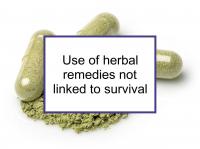A new study has reported that herbal remedy use is weakly linked to poorer survival and poorer physical health-related quality of life among women who have survived breast cancer for at least 10 years. Few studies have been performed concerning survival related to herbal remedy use among women with breast cancer.
The study included 371 Los Angeles white women (both Non-Hispanic and Hispanic) who had survived at least 10 years after a diagnosis of breast cancer. To conduct the study, the authors collected data during 1999 and 2000 using telephone interviews regarding herbal remedy use and quality of life among study participants. Remedies included in the study were bee pollen, licorice root, black cohosh, mother wort, blue cohosh, nux vomica, chaste berries, progesterone topical (vitex agnus actii), progesterone cream (wild Mexican yam), chickweed tincture, pulsatilla, dong quai, royal jelly, echinacea, sage tea, evening primrose oil, sarsaparilla, false unicorn, sepia, garlic, St. John's wort, ginkgo biloba, valerian, ginseng, wild yam root, herbal tea used as a remedy, shark cartilage, and lachesis.
Fifty-nine percent of participants were herbal remedy users (defined as a user of any of these remedies). The women were followed for survival from the baseline interview through year-end 2007. A total of 299 surviving patients were interviewed by telephone a second time concerning quality of life during the period 2002 to 2004. However, no information was collected concerning the timing, duration or frequency of herbal remedy use. Results were adjusted for breast cancer-related factors such as age at diagnosis, cancer stage, and cancer treatment.
Echinacea, herbal teas, and ginkgo biloba were the most commonly used herbal remedies among participants. As a result, the authors assessed the effects for only these remedies separately, as well as for overall herbal remedy use. Herbal remedy use was found to be associated with increases in risk of death from any cause and risk of breast cancer-specific death. While suggestive, these results were not statistically significant. Ginkgo biloba use was not found to be linked to increased risk of death. The herbal remedy users' physical quality of life declined more than those of non-users during the study period.
The authors conclude that the study provides some evidence that herbal remedy use is associated with poorer survival and poorer physical health-related quality of life among women who have survived breast cancer for at least 10 years. The authors further comment that the conclusions are based on exploratory analyses of data and are limited by few deaths for mortality analysis and lack of information on when herbal remedy use was initiated or duration of or reasons for use.
Comments regarding the study
This is a disappointing study because the results are so limited and inconclusive. The only specific finding was that ginkgo biloba use is not associated with increased risk of death, including breast cancer-specific death. However, the failure to demonstrate any benefit from the use of herbal remedies is also a result of the study. In addition, the suggestion that such use could be linked to poorer survival indicates that one or more of the herbal remedies included in the study might actually promote breast cancer progression. We caution breast cancer patients and survivors not to use herbal remedies that have not been studied and proven safe for those with breast cancer.
